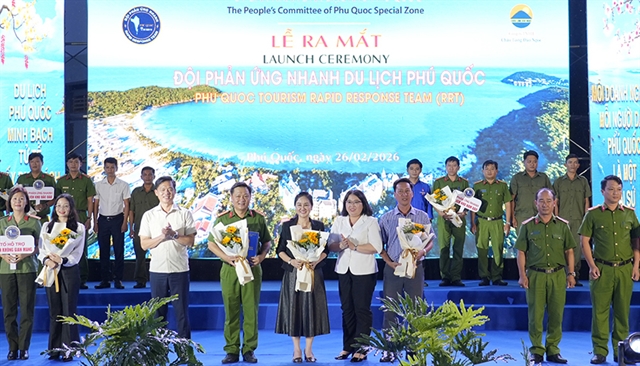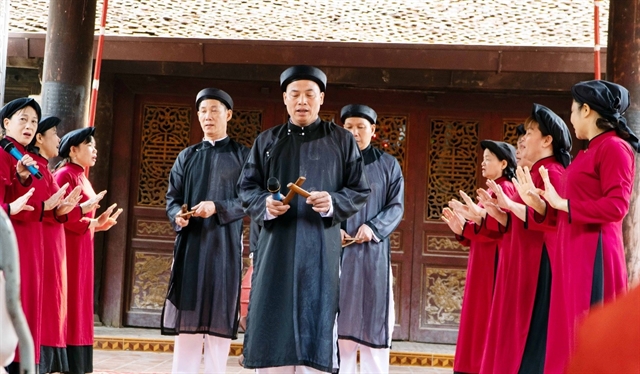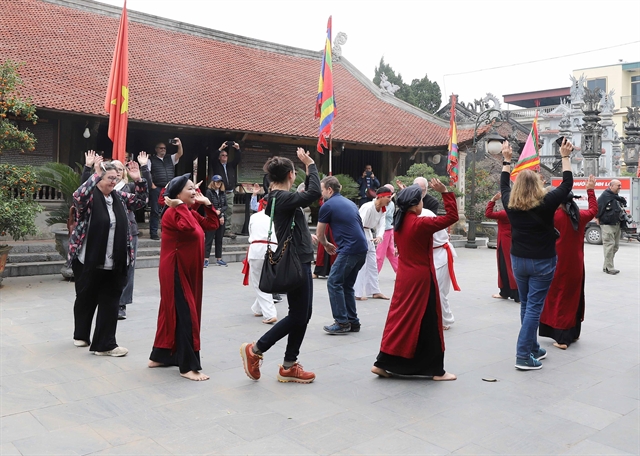 Life & Style
Life & Style


|
| Xoan singers perform at a cultural heritage site in Việt Trì Ward, Phú Thọ Province. —VNA/VNS Photo Tạ Toàn |
PHÚ THỌ — Hát Xoan (Xoan singing), a valuable intangible cultural heritage practice of the northern province of Phú Thọ, is linked to the worship of the Hùng Kings, a belief rooted in Vietnamese ancestor worship.
According to researchers, Xoan singing in Phú Thọ and the worship of the Hùng Kings have a strong bond, as the singing is performed during rituals.
With its rustic melodies and simple yet culturally rich lyrics, the art form not only reflects the spiritual life of local people, but also helps position the nation’s cultural identity on the world heritage map.
Unique values rooted in national culture
Researchers said that the Xoan villages in Phú Thọ all originated from ancient villages of the early nation-state previously known as Văn Lang. The art generated from these villages thus contains historical and cultural elements dating back to the time the nation was founded. Xoan singing has a close bond with festivals and the spiritual life of local residents.
The origin of the art is steeped in mystery, with various legends about it told since the Hùng Kings’ era. One of them states that Xoan singing was performed in spring to welcome the New Year and also to pray for good weather, bumper crops, wealth, fortune, peace and blessings for the Hùng Kings.
The singing is a type of traditional art performed during rituals and celebrations, comprising multiple elements including instrumentation, singing and dancing, all of which serve the spiritual needs of the community.
Phạm Bá Khiêm, a folklore researcher from Phú Thọ Province, noted that Xoan singing is not just a performing art but also a significant repository of cultural knowledge. It reflects the labour, emotions and customs of agricultural communities in the northern midland region. Each melody allows listeners to feel a deep love for their homeland, a sense of community, and a longing for a prosperous life.
The unique value and enduring vitality of Xoan singing have been recognised globally. In 2011, UNESCO listed the art genre as intangible cultural heritage in need of urgent safeguarding. Just six years later, in 2017, thanks to concerted efforts by the political system, community support and the dedication of artists, Xoan singing was removed from the urgent safeguarding list and named on the Representative List of Intangible Cultural Heritage of Humanity.
Expanding heritage preservation spaces

|
| Foreign tourists join Xoan singing with local artists at Hùng Lô Communal House. —VNA/VNS Photo Tạ Toàn |
Dương Hoàng Hương, director of the Department of Culture, Sports and Tourism of Phú Thọ Province, said that Xoan singing is a source of pride for the people of the ancestral land, serving as a testament to the resilience of Vietnamese culture.
He added that the province will continue to strengthen conservation efforts and bring Xoan singing closer to the public, linking it with tourism development so the art not only thrives within the community, but also resonates globally.
Over the past few years, provincial authorities have implemented a range of measures to preserve and promote the genre. The locality has restored activities in four original Xoan wards: Phù Đức, Thét, Kim Đới and An Thái.
It has renovated communal houses, the traditional space for performances, and organised festivals featuring Xoan singing. Senior artists have been encouraged to teach young people, fostering a new generation of performers.
A key highlight is the introduction of Xoan singing into schools. From primary to lower secondary levels, students learn basic melodies and explore the history, customs and cultural significance of the art. Many children have become the next-generation 'seeds', carrying forward the passion handed down by the artists.
People's Artisan Nguyễn Thị Lịch from Vân Phú Ward expressed her happiness at the thriving of Xoan singing in her hometown.
"My entire life has been intertwined with Xoan singing, which has become an integral part of who I am," she said.
"Seeing the younger generation passionately learning Xoan singing brings me great joy. It shows that the heritage of our ancestors continues to live on in the hearts of today's generation and will resonate into the future."

|
| Students from Việt Trì Ward experience Xoan singing with artists at Hùng Lô communal house. —VNA/VNS Photo Tạ Toàn |
Performance programmes, festivals and exchanges of Xoan singing have been regularly organised, both honouring the traditional art and encouraging community engagement.
Linking the art with tourism has opened up new opportunities. Tours to the Hùng Kings Temple, the Hùng Lô ancient village and historical sites in Phú Thọ now include experiences of listening to, watching and practicing the singing, leaving a lasting impression on visitors.
Today, Xoan singing is not only preserved in its original form, but also renewed and reinvented to match contemporary life. Many young artists are experimenting with adding modern elements to traditional melodies, creating musical works that are both imbued with the heritage’s essence and attractive to the young. Some shows have even combined Xoan with other art forms like dances, plays and lighting effects, further enhancing its charm.
Many artists and clubs have also impressed international guests when performing at major events, helping popularise the image of a hospitable and culturally diverse Việt Nam to the world.
Preserving and promoting Xoan singing is not only about safeguarding an art form, but also upholding cultural identity and fostering the Vietnamese people’s solidarity, national pride and aspirations.
As long as Xoan singing echoes, the cultural lifeblood of the ancestral land will continue to flow, enriching the spiritual life of the people and strengthening Việt Nam's cultural presence in the world. — VNS




